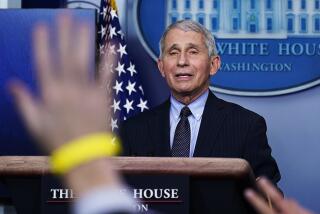Scientist Wants Disputed Paper Retracted
- Share via
WASHINGTON — Nobel prize-winning molecular biologist David Baltimore, who is also president of New York’s Rockefeller University, Wednesday asked that an influential scientific paper bearing his name be retracted because of evidence that it contained fraudulent data.
Baltimore acted just hours after several major news organizations were leaked copies of a draft report of an official government investigation into the paper, which was published in the scientific journal Cell in 1986 and which purported to make a critical contribution to understanding the immune system.
The draft report, prepared by the Office of Scientific Integrity of the National Institutes of Health, detailed numerous instances in which one of Baltimore’s co-authors, Tufts University researcher Thereza Imanishi-Kari, allegedly falsified and manufactured data for the paper.
Although the report does not implicate Baltimore in any scientific fraud, it criticizes him for defending the paper’s scientific honesty despite evidence, which grew over five years of controversy and inquiries, that parts of it are fraudulent.
“It is difficult to comprehend his maintaining this stance as the evidence mounted that serious problems existed with the . . . data in the Cell paper,” the report said. It termed Baltimore’s criticism of the investigation “deeply troubling.”
Baltimore’s request to withdraw the Cell paper, a dramatic reversal of his stance, is the latest development in a controversy that has so far led to two university reviews, numerous congressional hearings, three lengthy NIH investigations and a national debate about how science should best be policed.
“The draft report, if it stands without major changes, raises very serious questions about the veracity of the serological (serums) data in the paper,” Baltimore said. “Therefore, I am asking the other authors to join with me in requesting that the journal retract the paper until such time as the questions are resolved. It is up to Thereza Imanishi-Kari to resolve them.”
Baltimore had previously insisted that the charges leveled against Imanishi-Kari were groundless, a conclusion that had been supported by the three previous scientific reviews of the Cell paper.
But the Office of Scientific Integrity draft report was unequivocal in its conclusions. “The forensic evidence and the extensive statistical analyses established that (two sets of Imanishi-Kari’s data) are fabricated,” the report said. “Dr. Imanishi-Kari repeatedly presented false and misleading information to the NIH and OSI and to the expert scientific panels,” it continued, adding that a “substantial portion” of the key notebooks used by Imanishi-Kari to record her laboratory observations “was falsified.”
Neither Imanishi-Kari nor her attorney, Bruce Singal, would comment on the report’s conclusions.
More to Read
Sign up for Essential California
The most important California stories and recommendations in your inbox every morning.
You may occasionally receive promotional content from the Los Angeles Times.













